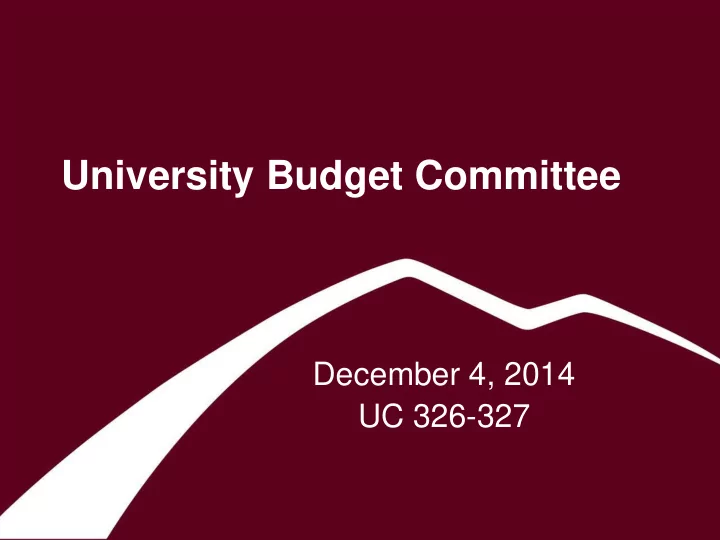

University Budget Committee December 4, 2014 UC 326-327
Agenda • UBC Charge and Timeline • FY15 Budget • Allocation Model • Governor’s Proposed Budget
University Budget Committee – Charge C HARGE To develop a budget plan for each biennium through identifying and suggesting necessary base adjustments to the budget model prior to consideration of new budget initiatives or strategic reallocations; to evaluate budget reports, new initiative proposals, and requests for current year budget adjustments; to make recommendations to the President and the Council of Vice Presidents regarding current year budget adjustments, one-time-only allocations from Contingency, base budget changes, reallocations, or new initiatives; and to coordinate the continued refinement of the biennial budget model.
University Budget Committee – Timeline • Draft budget for the next fiscal year to cabinet by November 15 th of each year – First draft needs to incorporate revenue estimates from enrollment projections (comes from the Planning Committee) – Final budget will not be approved until later in year • Units know how to plan expenditures for the following year by early in spring semester
FY15 Budget Current Status Tuition Revenue Collected Budget Actual Revenue** Difference Summer* $4,777 $4,260 ($517) Fall* $43,759 $44,122 $363 Total $48,536 $48,382 ($154) *Amounts in thousands of dollars ** Revenues reflective as of December 1, 2014
FY15 Budget Full-Time Equivalent Status Budget FTE Actual FTE Difference Summer 1,095.25 981.92 (113.33) Fall 11,458.25 11,572.35 114.1 Spring 10,923.2 ????
Allocation Model Model Components • Instructional • Facilities • Institutional Commitments • Non-Instructional Areas • Strategic Initiatives
Allocation Model Current Activity – Instructional Data Validation • Credit Hours – Cleaning up course association to Department and College (working with FAM group) • Calculating Average Class Size – Cleaning up definitions • Creating three year averages – Percent SCH taught by T/TT Faculty
Allocation Model Timeline • January – Update Instructional Component • February & March – Student Affairs review and possible development of a metric driven formula • January thru March – Finalize Institutional Commitments – Update Facilities Calculation – Update Non-Instructional Areas • This includes areas within Instructional Departments that are not directly involved in instruction … Lab Techs, IT support, etc.
Allocation Model Position Control • GOAL: General funded positions will be funded centrally • Two phases to this process development: – Identify the starting list of positions – Create a process for review and modifications • OPBA create a list of all general funded positions and associated FTE (will come from the allocation model work) • Review positions that have been open for several years
Governor’s Budget State Appropriations • General Fund Components – Tuition and Mandatory Fees – State Appropriations
Governor’s Budget State Appropriations Flowchart Institution State Estimates OCHE Budget Expenses for Office next Biennium Current Position – HB 2 Governor’s Impact on Legislature HB 5 Budget Campuses HB 13 still being reviewed
Governor’s Budget State Appropriations Flowchart- continued HB 2 and HB 13 Only HB 2 UM and MSU HB 5 System Allocation by OCHE Resident FTE (3- HB 13 year average) HB 2 – General Appropriation Act HB 13 – State Employee Pay Plan UM Missoula share UM – Missoula allocates added to GF and HB 5 – Long Range Building Approp to affiliates allocated to Departments
Governor’s Budget State Appropriations Flowchart Institution State Estimates OCHE Budget Expenses for Office next Biennium Current Proposal HB 2 requires 10% Governor’s Legislature HB 5 allocation Budget through HB 13 Performance Funding and a resident tuition freeze HB 5 UM System $20M
Governor’s Budget State Appropriations Flowchart- continued HB 2 UM and MSU HB 5 Allocation by OCHE Resident FTE (3- HB 13 year average) UM Missoula share UM – Missoula allocates added to GF and to affiliates allocated to Departments Estimate Tuition and Mandatory Fee Revenues are added to appropriations, then distributed to campus
Recommend
More recommend